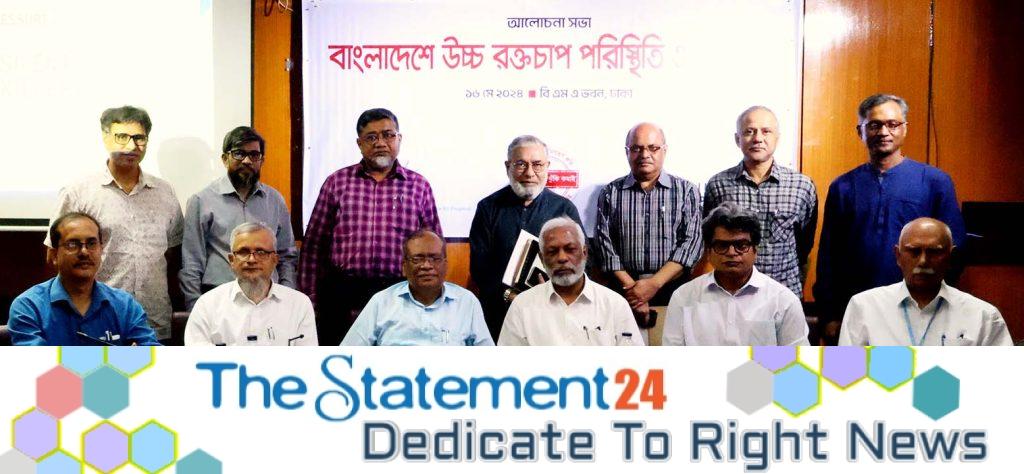
The prevalence of hypertension and hypertension-related various non-communicable diseases (NCDs) is growing increasingly in Bangladesh. Although the government has taken several initiatives to control hypertension, ensuring necessary allocation for an uninterrupted supply of medicine across the country remains a challenge. According to experts, premature deaths from NCDs can be reduced to a great extent by controlling hypertension alone. They recommended allocation of the necessary funding for this sector in the upcoming budget for FY 2024-25. These issues were highlighted at a discussion meeting titled “Hypertension Situation in Bangladesh and Way Forward” held at the capital’s BMA Bhaban on Thursday, May 16. The discussion meeting was organized on the occasion of World Hypertension Day by research and advocacy organization PROGGA (Knowledge for Progress) with support from Global Health Advocacy Incubator (GHAI). This year World Hypertension Day will be observed under the theme “Measure Your Blood Pressure Accurately, Control It, Live Longer”.
It was informed at the discussion meeting that one in every four adults in Bangladesh is suffering from hypertension and it is one of the major risk factors for various non-communicable diseases including heart diseases, stroke, cancer, kidney diseases, respiratory diseases and diabetes. According to WHO’s first Global Report on Hypertension 2023, 2 lakh 73 thousand people died of cardiovascular disease in 2019 in Bangladesh and 54 percent of these fatalities were attributable to hypertension. Although non-communicable diseases account for 70% of the total deaths in Bangladesh, the budgetary allocation dedicated to combat NCDs is alarmingly low, comprising only 4.2 percent of the total health budget.
Emeritus Professor Dr A.B.M. Abdullah, Personal Physician to the Hon’ble Prime Minister of Bangladesh said at the discussion meeting, “Controlling hypertension can significantly curb the prevalence of non-communicable diseases. The government of Bangladesh has already made a decision to provide anti-hypertensive medicine from community clinics, which is highly commendable. However, necessary budgetary allocation must be ensured to keep the supply of the medicine uninterrupted.”
Dr. Md. Enamul Haque, Director General (Additional Secretary), Health Economics Unit said, “Research shows that investing Tk 1 for hypertension screening and medicines can yield an overall benefit worth Tk 18. Hypertension-related non-communicable diseases can be brought under control through increased investment and its effective utilization.”
Dr. Md. Quiume Talukder, Line Director (CBHC), Directorate General of Health Services (DGHS) said at the event, “We are working towards ensuring the availability of anti-hypertensive medicine from all Upazila Health Complexes and Community Clinics gradually. Successful implementation of this program will pave the way for substantial reduction in the prevalence of hypertension and non-communicable diseases.”
Md. Zakir Hossain, Deputy General Manager (Sales & Marketing) of Essential Drugs Company Limited (EDCL) said, “We are optimistic about ensuring the availability of anti-hypertensive medicines from all Community Clinics from the upcoming fiscal year 2024-25.”
Dr. Laila Akhter, Director, Bangladesh Food Safety Authority (BFSA); Professor Dr. S M Mustafa Zaman, Department of Cardiology at Bangabandhu Sheikh Mujib Medical University (BSMMU) and President, Bangladesh Cardiovascular Research Foundation; Professor Dr. Syed Abdul Hamid, Institute of Health Economics, Dhaka University; Professor Dr. Khaleda Islam, Director, Institute of Nutrition and Food Science, Dhaka University; Professor Dr. Malay Kanti Mridha, BRAC James P Grant School of Public Health of BRAC University; Dr. Abu Jamil Faisel, President Elect, Public Health Association of Bangladesh; Dr Syed Mahfuzul Huq, National Professional Officer, WHO Bangladesh Office; Obaidul Kabir, Executive Editor, Daily Janakantha and ABM Zubair, Executive Director of PROGGA also spoke at the event, moderated by Journalist Sukanta Gupta Alak. The key-note presentation was delivered by PROGGA’s Coordinator Sadia Galiba Prova and the discussion meeting was chaired by Muhammad Ruhul Quddus, Bangladesh Country Lead of GHAI.

